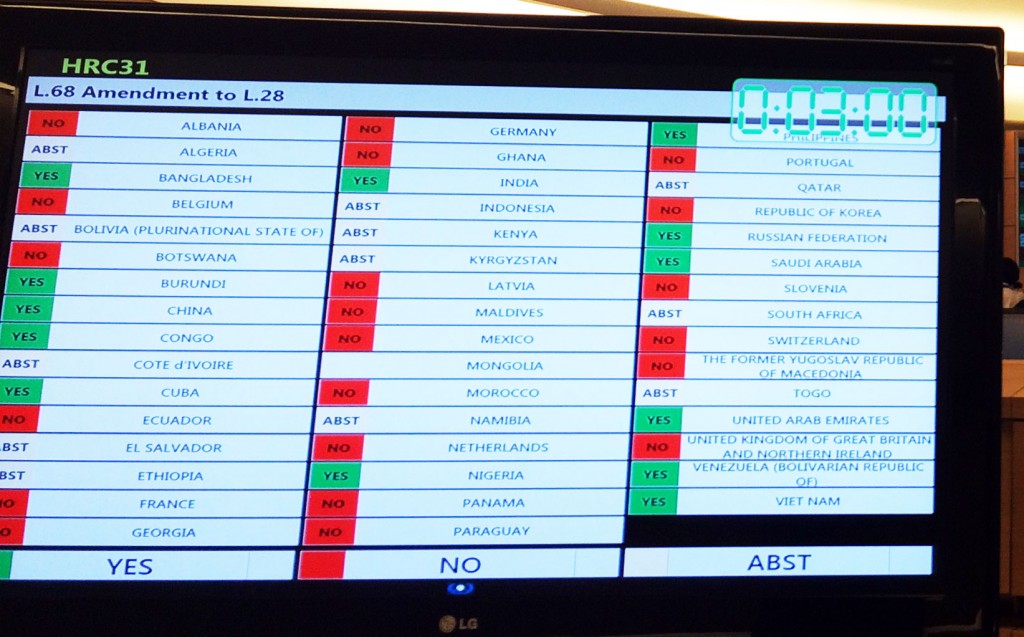Update 24 March: See the end of this post for results…
A vital motion to be considered by the UN Human Rights Council, either today or tomorrow, on protecting human rights defenders, risks being undermined by five states proposing a raft of hostile amendments.

Protesters carry images of Berta Cáceres, Honduran human rights defender who was murdered Thursday 3 March 2016
The resolution itself aims at “Protecting human rights defenders addressing economic, social and cultural rights”.
But the hostile amendments include a proposal to delete the term “human rights defenders” itself!
The International Humanist and Ethical Union (IHEU) has joined with the International Service for Human Rights and at least 110 NGOs in criticising the hostile amendments, urging member states to approve the resolution unchanged.
The hostile resolutions have been brought by five countries, in most cases all five together. These states are: Russia, China, Egypt, Cuba and Pakistan.
An open letter from the NGOs, including the IHEU, points out that the resolution as drafted was developed in open and transparent negotiations, and that it is is “balanced and appropriate” as it stands. The letter also notes the history of support for human rights defenders in economic, social and cultural issues in particular:
“South African jurist and former High Commissioner for Human Rights, Navi Pillay, has articulated the importance of such a resolution in the following terms:
As a South African, I have seen and experienced first-hand the role of ESC rights defenders in combating poverty and injustice and in promoting universal human rights for all, even the most powerless and disadvantaged. I have seen how the work of those who defend ESC rights benefits entire communities; just as attacks against those who defend ESC rights harm entire communities. That is why it is so important and timely that the UN Human Rights Council is currently negotiating a resolution on the protection of ESC rights defenders.“

IHEU Director of Advocacy, Elizabeth O’Casey
The IHEU has discussed the importance of defending human rights defenders before. And from Geneva, IHEU’s Director of Advocacy, Elizabeth O’Casey, comments:
“This resolution has been one of the most collaborative resolutions in terms of efforts from its sponsors to get consensus on it – this has included five informal meetings (which is unusually high).
It is deeply disappointing, to say the least, that China, Cuba, Egypt, Pakistan and Russia have tabled amendments to a resolution seeking to protect the vital work of human rights defenders, people who play a crucial role in promoting transparency, accountability and the realisation of human rights for all. The proposals from these five states include efforts to weaken protection against attacks and reprisals on human rights defenders, and actually remove any reference to the term ‘human rights defenders’ in the text. When you consider the treatment of such defenders in the states concerned, the amendments are even harder to take.”
The NGOs’ letter notes that the adverse amendments come against recent crackdowns on HRDs in many states, a trend which is “so tragically illustrated at the commencement of the 31st session [the current session of the Human Rights Council] with the murder of Honduran woman human rights defender Berta Caceres”, and which should serve to highlight the importance of human rights defenders. But the states bringing hostile amendments are nevertheless “seeking to seriously undermine the text.” The letter further argues that the hostile amendments:
“…should be seen in the context of the systematic efforts currently underway in several of these States to restrict and criminalise the important and legitimate work of human rights defenders and independent civil society organisations in violation of international human rights law. The proposal to weaken language on reprisals should similarly be understood in the context of several of the proposing States being the subject of allegations of intimidation or reprisals in both the Secretary-General’s report and the joint communications report of Special Procedures.”
The hostile amendments include:
- Removing any reference to the term ‘human rights defenders’
- Denying the legitimacy of the work of human rights defenders
- Weakening protection against, and accountability for, intimidation and reprisals against human rights defenders and others who cooperate with the United Nations
- Failing to acknowledge the specific risks and violations faced by women, indigenous, and land and environment human rights defenders, their families and communities
- Diluting and regressing from consensus language and terminology from past human rights defenders resolutions
- Seeking to justify limitations on human rights that are impermissible under international human rights law.
Notes:
- The full text of the original resolution on protecting human rights defenders addressing economic, social and cultural rights: A_HRC_31_L28 (docx).
- The NGOs’ joint letter to member states of the UNHRC (PDF).
Update 24 March: Success! The hostile amendments were defeated and the resolution on the protection of human rights defenders (HRDs) was adopted by a significant majority. Some of the hostile amendments bought by Russia, China, Egypt, Cuba and Pakistan, were additionally supported by HRC member states including Bangladesh, Burundi, Congo, India, Nigeria, Philippines, Saudi Arabia, United Arab Emirates, Venezuela, and Viet Nam. Nevertheless many of these states voted to adopt the resolution without the adverse changes. (Note that Egypt and Pakistan are not current member states of the HRC, so while they were able to jointly put forward the hostile amendments, they were not able to vote on them, nor on the adoption of the resolution itself.)
The final vote to adopt the resolution on protecting HRDs was won by a 33 to 6 majority, with 8 abstentions. The member states voting against adoption of the resolution on protecting HRDs were Burundi, China, Cuba, Nigeria, Russia, Venezuela; while abstentions came from Bolivia, El Salvador, Kenya, Namibia, Qatar, Saudi Arabia, United Arab Emirates, and Viet Nam.
Also see: press release on the victory from International Service for Human Rights (ISHR).
